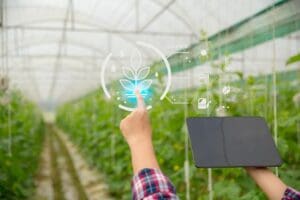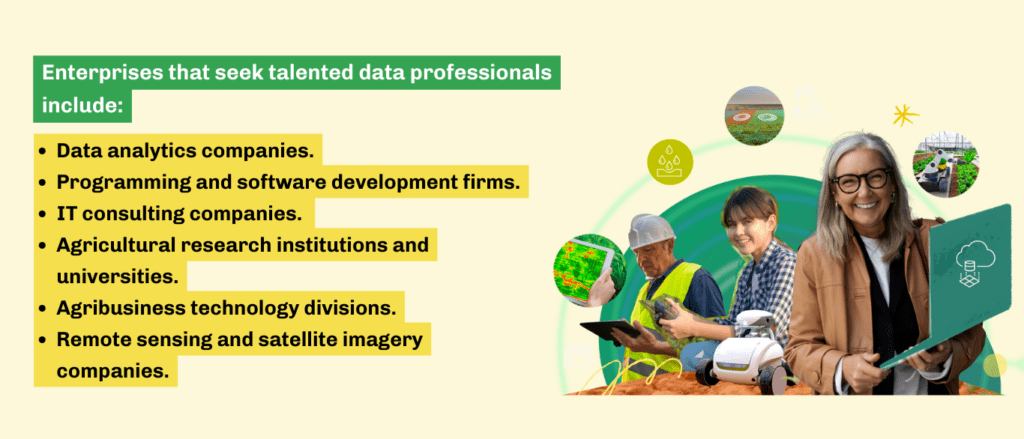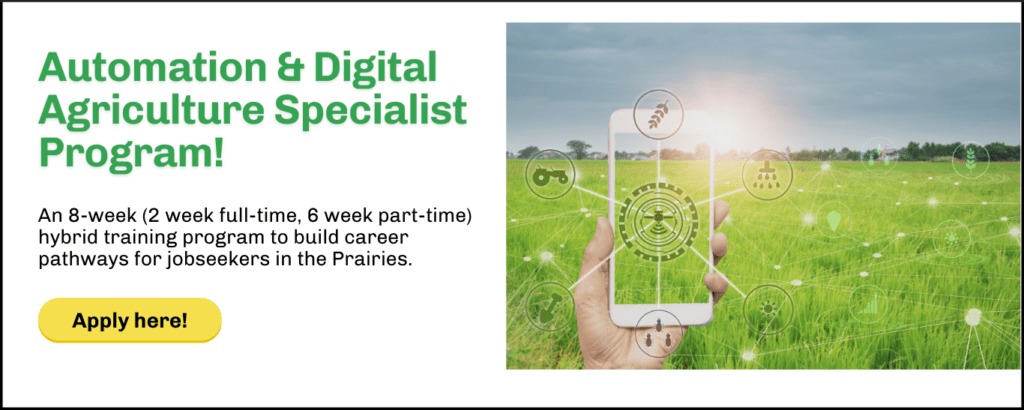Data and the big picture
There’s no question that opportunities abound in digital agriculture in Canada right now, particularly when it comes to using data. Producers and agricultural businesses across the country understand that generating and sharing data will be critical for driving innovation, boosting efficiency, and building Canada’s competitive edge in global markets. Add to this is the fact that by enhancing and improving how data gets used throughout the agricultural sector, we will be better able to meet our important social and environmental goals, including greater global food security and a lower-emission food-production system.
With so much at stake, the country is at a hinge point when it comes to the adoption of sophisticated digital and precision agriculture. Governments and the private sector understand the need for investment, but there is already a critical shortage of talented people who can help Canadian producers and businesses use data. It’s one of the reasons Palette Skills launched its innovative Automation and Digital Agriculture Specialist program, with a stream dedicated to programming and data science. The highly successful upskilling program is an 8-week accelerated hybrid training that equips participants with automation and digitization skills for agricultural production, with a focus on employment. 
Big data on the farm
To truly take advantage of the burgeoning opportunities, it’s critical to quickly deploy talent where it’s needed. As Canadian producers manage generational change as well as the challenge of transitioning away from legacy equipment and systems, it’s more important than ever to make digital professionals available throughout our country’s agricultural ecosystem. From understanding data related to climate change and agricultural productivity to contributing to national and global agricultural datasets, there has never been a better time to be a data professional in Canada’s agricultural scene.
Connecting talent to business
It’s one of the reasons why so many businesses and producer organizations in the agricultural scene are joining with Palette Skills as employer partners. Entrepreneurs and business leaders know that Palette Skills provides a solution to the challenge of finding top agtech talent. That’s because program graduates have undergone rigorous and intensive hands-on training that’s designed in collaboration with top agtech enterprises and academic partners. The goal is to get skilled professionals ready to manage the adoption of data-driven agriculture as quickly as possible.
Participants in the Automation and Digital Agriculture Specialist program get to meet with employers throughout the course in workshops, networking sessions, and in on-the-ground visits to producers and enterprises engaged in the cutting edge of data-driven precision agriculture. It’s an innovative and non-traditional way of bringing together talent and business, with impressive results.
We spoke to Damon Johnson, Chief Technology Officer at Solutions globales en matière de risques agricoles, about his company’s experience with the program.
“We had a really humbling pinch-point when it came to attracting talent,” says Johnson, “but it created the most amazing opportunity by way of Palette Skills. As we got oriented with the group in the digital agriculture program, seeing the real discipline behind what they were learning, and what the outputs were going to be in the employment market was really exciting.”
The result, says Johnson, was that “we got the [talent] solution months faster with Palette Skills.”
The Data Analyst and Programmer specialization
The Data Analyst and Programmer stream focuses on the analysis and utilization of data to drive insights and innovation in the agricultural sector. Professionals entering this stream bring along an aptitude for programming, mathematics, and strong analytical and problem-solving skills. They can expect relevant and focused training in data science, from extracting different data sets to machine learning, model training and the visualization of model outputs by using GIS. Moreover, they will learn how to apply these techniques in practical settings throughout the agricultural industry.
In addition, participants will get hands-on training when it comes to data collection and management, data cleaning and preprocessing, statistical analysis and modelling, machine learning and predictive modelling, as well as data visualization and interpretation.
The goal is to mobilize great talent to apply data-driven approaches to optimize crop yields, predict market trends, improve resource management, and develop innovative solutions for sustainable agriculture. It’s an exciting field with opportunities for people who are curious about data and have a background either in data analytics, GIS or software development and are ready to embrace unique agricultural challenges which require a high level of collaboration and aptitude to solve complex agricultural problems.

Where will your new career take you?
So what are the kinds of companies and businesses you can expect to be working with when you complete the Data Analyst and Programmer stream in Palette Skills’ Automation and Digital Agriculture Specialist program? The following are just some of the different kinds of firms and enterprises who are looking to hire talented data professionals!
– Data analytics companies specialize in collecting, analyzing, and interpreting agricultural data to provide insights and recommendations to farmers and agribusinesses. They often develop proprietary algorithms, machine learning models, and design innovative data visualization tools.
– Meanwhile, programming and software development firms focus on creating applications and tools specifically designed for the agricultural sector. These businesses develop farm management software, data collection and analysis tools, and other digital solutions critical to the success of precision agriculture.
– IT consulting companies require skilled data professionals to bring IT consulting to producers and enterprises throughout the agricultural sector to help optimize technology infrastructure.
– Agricultural research institutions and universities play a critical role in conducting studies, developing models, and advancing knowledge in the field of digital agriculture. Research institutions focused on advancing technological innovations in agriculture study and develop models for improved data collection and analysis throughout the agricultural sector.
– Larger agribusiness companies often have their own agribusiness technology divisions dedicated to data analysis and programming. These divisions focus on leveraging data to optimize agricultural practices, develop predictive models, and enhance decision-making processes for farmers and enterprises.
– Last but not least are a growing number of remote sensing and satellite imagery companies that specialize in collecting and analyzing data from satellites, drones, or remote sensing technologies to provide insights and information on crop health, soil moisture, and other relevant parameters.
Find out more about the Automation and Digital Agriculture Specialist program
The word is out that the Automation and Digital Agriculture Specialist program is a vital link between talented individuals seeking a career in agtech and the most dynamic businesses in the Prairies. This is especially true for people choosing to enter the Data Analyst and Programmer Stream. With an innovative combination of practical experience, business and professional coaching with soft skills training, the stream will connect you to innovative agtech businesses and start-ups who are looking to hire now.
Êtes-vous prêts ? Find out more about the program here!








